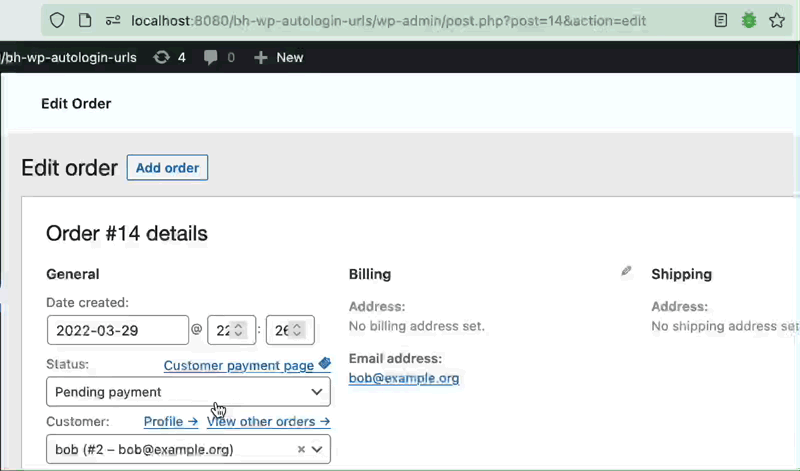Adds single-use passwords to WordPress emails' URLs for frictionless login, and magic-link emails for passwordless login.
This plugin hooks into the wp_mail filter to augment existing URLs with login codes so users are automatically logged in when visiting the site through email links.
It is in use for a charity whose annual requests for donations to non-tech-savvy users was resulting in users unable to remember their password. Now those users are instantly logged in.
It should also help solve the problem with WooCommerce abandoned cart emails where the user must be logged in to know who abandoned the cart.
Also useful for logging users back in when they get reply notifications for their comments, bbPress posts etc.
 Example email sent via Comment Reply Email Notification plugin.
Example email sent via Comment Reply Email Notification plugin.
This plugin makes minor theme/user-facing changes on login forms. An additional "Email Magic Link" button is added which sends an email containing with an autologin URL to instantly log in users. This applies to wp-login.php and to WooCommerce login forms.
Install Autologin URLs from the WordPress plugin directory.
There is no configuration needed. By default:
- Codes expire after seven days
- Emails to admins do not get autologin codes added
- Some emails are filtered out by subject using regex
The settings page can be found in the admin UI under Settings/Autologin URLs, as a link on the Plugins page, or at /wp-admin/options-general.php?page=bh-wp-autologin-urls.
- Hooked on
wp_mail - Login code consists of user id and random alphanumeric password separated by
~ - Stored in a WordPress database table, hashed so no relationship between each code and any user can be determined
- Deleted after a single use
Links take the form: https://brianhenry.ie/?autologin=582~Yxu1UQG8IwJO
Logs to see the frequency of its usefulness are available at: wp-admin/admin.php?page=bh-wp-autologin-urls-logs
WooCommerce's "Customer Payment Page" link has been changed to include an autologin code and to copy to clipboard when clicked (to avoid logging out shop managers).
- MailPoet 3.x
- The Newsletter Plugin
- Klaviyo
When newsletters are sent with any of the above integrations, their own tracking URLs are used to determine the current user to log them in. If there is no local WordPress account, the user's email and name are set on the WooCommerce checkout.
The plugin conforms to all the suggestions in the StackExchange discussion, Implementing an autologin link in an email:
- Cryptographically Secure PseudoRandom Number Generation (via wp_rand)
- Stored as SHA-256 hash
- Codes are single use
- Codes automatically expire
Additionally, authentication via Autologin URLs is disabled for 24 hours for users whose accounts have had five failed login attempts through an autologin URL and for IPs which have attempted and failed five times.
Warning:
If you use any plugin to save copies of outgoing mail, those saved emails will contain autologin URLs.
Warning:
If a user forwards the email to their friend, the autologin links may still work. The autologin codes only expire if used to log the user in, i.e. if the user is already logged in, the code is never used/validated/expired, so continues to work until its expiry time. This behaviour was a performance choice (but could be revisited via AJAX and not affect page load time).
- Additional database queries only occur when a URL with
autologin=is visited - No database queries (beyond autoloaded settings) are performed if the autologin user is already logged in
- A nightly cron job deletes expired autologin codes
Two filters are added to expose the main functionality to developers of other plugins (which don't use wp_mail()), e.g. for push notifications:
$url = apply_filters( 'add_autologin_to_url', $url, $user );
$message = apply_filters( 'add_autologin_to_message', $message, $user );
Filters to configure the expiry time, admin enabled setting and subject exclusion regex list are defined in the BrianHenryIE\WP_Autologin_URLs\WP_Includes\WP_Mail class.
API functions can be accessed through plugin's global:
/** @var BrianHenryIE\WP_Autologin_URLs\API\API $autologin_urls */
$autologin_urls = $GLOBALS['bh-wp-autologin-urls'];
NAME
wp autologin-urls get-url
DESCRIPTION
Append an autologin code to a URL.
SYNOPSIS
wp autologin-urls get-url <user> [<url>] [<expires_in>]
OPTIONS
<user>
User id, username/login, or email address.
[<url>]
The URL to append to.
---
default: /
---
[<expires_in>]
Number of seconds the code should be valid. Default WEEK_IN_SECONDS.
EXAMPLES
# Add an autologin code to the site root for brianhenryie which expires in one week.
$ wp autologin-urls get-url brianhenryie
# Add an autologin code to the URL /my-account for brianhenryie which expires in five minutes
$ wp autologin-urls get-url brianhenryie my-account 300
NAME
wp autologin-urls send-magic-link
DESCRIPTION
Send a magic login email to a user.
SYNOPSIS
wp autologin-urls send-magic-link <user> <url> [<expires_in>]
OPTIONS
<user>
User id, username/login, or email address.
<url>
The URL the link in the email should go to.
---
default: /
---
[<expires_in>]
Number of seconds the code should be valid.
---
default: 900
---
EXAMPLES
# Send a magic login link to user brianhenryie, if they exist.
$ wp autologin-urls send-magic-link brianhenryie
- Remove the autologin URL parameter in the browser location bar on success
- Verify i18n is applied everywhere __()
- Delete all passwords button in admin UI
- Error messages on settings page validation failures
- Client-side settings page validation
- Test adding an autologin code to a URL which already has one overwrites the old one (and leaves only the one).
The Newsletter Plugin integration– and any plugin that doesn't use wp_mailMagic link button on wp-login.php- Use:
$wp_hasher = new PasswordHash( 8, true );$hashed = $wp_hasher->HashPassword( $password ); - Add "send magic link" to wp-admin/user.php for admin use.
- Add UI to expunge rate limit / add allow-list for IPs
- https://github.com/danielbachhuber/one-time-login
- https://github.com/aaemnnosttv/wp-cli-login-command
GPLv2 or later.






